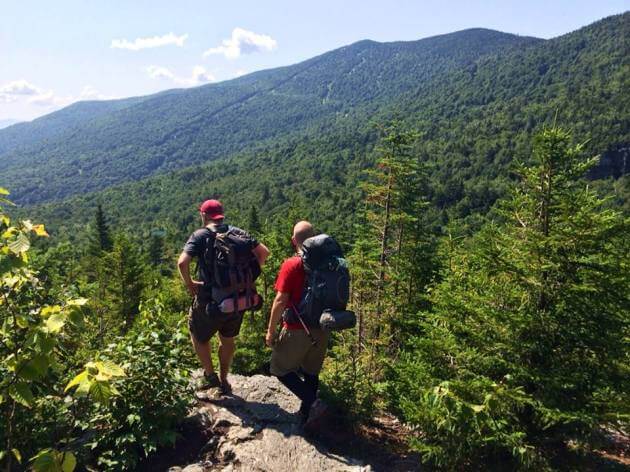Solo Hiking Appalachian Trail: Is It Safe?
The Appalachian Trail, spanning approximately 2,200 miles from Georgia to Maine, is one of the most iconic long-distance hiking trails in the United States. Every year, thousands of hikers set out to conquer this formidable path, with many opting to undertake the journey solo.
The question that often arises is: “Is it safe to hike the Appalachian Trail alone?” While hiking alone can be a rewarding and transformative experience, it is essential to understand the risks and prepare adequately to ensure safety.
Understanding the Risks
Hiking alone inherently carries more risks compared to hiking with a group. These risks are amplified on a trail as long and challenging as the Appalachian Trail. Here are some of the primary concerns:
- Isolation and Accessibility: The Appalachian Trail traverses remote wilderness areas, where cell phone service is often unavailable. In case of an emergency, getting help can be difficult and time-consuming.
- Wildlife Encounters: The trail is home to a variety of wildlife, including black bears, snakes, and ticks that carry Lyme disease. While wildlife encounters are generally rare, they can be dangerous.
- Weather Conditions: The weather can be unpredictable, with potential for severe storms, extreme temperatures, and sudden changes in conditions. Being alone makes it harder to manage these situations.
- Physical and Mental Challenges: Hiking the entire trail can take several months, requiring a high level of physical fitness and mental resilience. Injuries, exhaustion, and psychological stress are common among solo hikers.
- Human Threats: Though rare, there have been incidents of crime on the trail, including theft and assault. Being alone can make one more vulnerable to such threats.
Preparation is Key
To mitigate these risks, thorough preparation is essential. Here are some tips to help you prepare for a solo hike on the Appalachian Trail:

- Research and Planning: Before setting out, gather as much information as possible about the trail. Study the terrain, climate, and potential hazards. Plan your route and schedule, and be flexible to adapt to changing conditions.
- Physical Fitness: Ensure you are in good physical condition. Training hikes, strength training, and cardio exercises can help build the endurance and strength needed for the trail.
- Gear and Supplies: Invest in high-quality gear, including a sturdy backpack, reliable footwear, and weather-appropriate clothing. Carry essential supplies such as a first-aid kit, navigation tools, water purification methods, and enough food.
- Safety Devices: Consider carrying a personal locator beacon (PLB) or a satellite messenger device. These can send distress signals and your GPS location in case of an emergency, even when there is no cell service.
- Leave No Trace Principles: Familiarize yourself with Leave No Trace principles to minimize your impact on the environment. This not only helps preserve the trail but also promotes safety by reducing encounters with wildlife attracted to food or waste.
Safety Tips for Solo Hikers
- Inform Others: Always let someone know your plans, including your route and expected return date. Check in regularly when you have cell service.
- Stay on the Trail: Straying off the marked trail can lead to getting lost. Stick to the designated path and use maps and GPS for navigation.
- Trust Your Instincts: If a situation feels unsafe, trust your instincts. Whether it’s a person, a campsite, or a section of the trail, it’s better to err on the side of caution.
- Pace Yourself: Hiking long distances every day can lead to exhaustion and injury. Listen to your body, take breaks, and don’t push yourself too hard.
- Stay Informed About Weather: Keep an eye on the weather forecast and be prepared for sudden changes. Adjust your plans accordingly to avoid dangerous conditions.
Personal Stories and Insights
Many solo hikers have successfully completed the Appalachian Trail and shared their experiences. These stories provide valuable insights and inspiration for those considering a solo hike.
Katherine’s Journey: Katherine set out on the Appalachian Trail alone to challenge herself and find solitude. She emphasizes the importance of mental preparation, as the isolation can be both a blessing and a challenge. Katherine relied on a network of fellow hikers she met along the way, forming temporary alliances for companionship and safety.
John’s Experience: John, a seasoned hiker, undertook the trail solo to reconnect with nature. His advice is to embrace the solitude and use it as an opportunity for self-discovery. He also highlights the camaraderie among hikers, noting that even when hiking alone, you are rarely truly isolated as the trail community is supportive and close-knit.
Benefits of Hiking Alone
Despite the risks, there are significant benefits to hiking the Appalachian Trail alone:

- Self-Reliance: Solo hiking fosters independence and self-reliance. You learn to make decisions, solve problems, and take care of yourself in a way that is different from when hiking with others.
- Personal Growth: The challenges and solitude provide a unique opportunity for personal growth. Many solo hikers find clarity, strength, and a sense of accomplishment that is deeply rewarding.
- Flexible Pace: Hiking alone allows you to set your own pace and schedule. You can take breaks, adjust your plans, and explore side trails without having to consider others’ preferences.
- Connection with Nature: Solitude enhances your connection with nature. Without distractions, you can fully immerse yourself in the surroundings, appreciate the beauty of the trail, and experience a profound sense of peace.
Conclusion
Hiking the Appalachian Trail alone is a bold and potentially life-changing endeavor. While it carries inherent risks, with proper preparation and a cautious approach, it can be a safe and rewarding experience.
The key is to understand the challenges, prepare thoroughly, and trust your instincts. Many solo hikers have successfully navigated the trail and emerged with powerful stories of adventure, growth, and connection with nature.
If you are considering a solo hike on the Appalachian Trail, embrace the journey with an open heart and a well-prepared mind, and you’ll find that the trail offers not just a physical challenge, but a path to personal transformation.


















